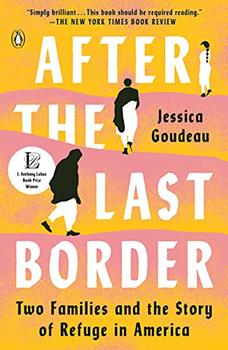Summary | Excerpt | Reading Guide | Reviews | Beyond the Book | Readalikes | Genres & Themes | Author Bio

Critics' Opinion:
Readers' Opinion:
First Published:
Aug 2020, 368 pages
Paperback:
Aug 2021, 368 pages
 Book Reviewed by:
Book Reviewed by:
Jamie Chornoby
Buy This Book
"Are you Saw Ku and Mu Naw? We're here to take you to your new home! Welcome to Texas!"
Mu Naw's face broke into a relieved grin.
The white woman and Karen man helped Mu Naw and Saw Ku get their bags from the revolving circle that spewed luggage out of a large metal mouth. Their bags were easy to spot: multicolored plastic zip-up bags they had purchased from a store in the refugee camp. Just a few days before, Mu Naw had approached a hut where the owner had opened the front wall to form a makeshift storefront. Rusted shelves held snacks and sodas, soap and toothbrushes and combs, rubber sandals in dusty plastic sacks, and a rotating inventory of whatever items he could sell. The store owner's children watched, squatting in the front of the store, their cheeks white with thanaka to protect them from the sun. Mu Naw tried not to smile too broadly when she walked up and asked the store owner respectfully for the Western bags. He turned and rummaged through the back of his hut, his children looking on solemnly. He handed her two, asking her where she was going.
"Taxi! We are going to go live in Taxi!" He nodded in response, as if he knew exactly where Taxi was. It would be years before she would realize the difference between the yellow cars you could hail on the street and the state where she lived, or laugh at the fact that she had confused the two.
Mu Naw held the bags proudly slung on her shoulder back through camp, deftly jumping along the uneven packed dirt paths, up the hill lined with huts on large bamboo stilts, past the concrete bathroom area with the trickle of water where everyone-women on one side and men on the other-bathed discreetly, covering themselves with longyi while they washed. Her neighbors eyed her. A few friends waved. The large square bags were a symbol of the trip she was taking, of her new status in the world. She had seen others walking with those bags before they disappeared from the camp forever.
The camp where she had lived in Thailand, Mae La, was supposed to be a temporary stop. After the infiltration of Laotian and Hmong refugees on the eastern border of Thailand in the 1970s and 1980s, the country had very little patience for the refugees arriving from Myanmar on the western border. Thailand had remained stable in spite of war in Vietnam, genocide in Cambodia, unrest in Laos, persecution of Hmong people wherever they lived in the region. The longest-running civil war in the world was not the problem of the Thai people. They designated land where those who crossed illegally into the country could live in ramshackle huts, packed together like pickled fish in a can. Mu Naw had not spent her entire life in the camp; she was unusual among her generation for that. Many of them could barely remember life in Myanmar and most left the camp only by sneaking out and avoiding roads with Thai police or military officials. Leaving the camp was illegal, and capture usually meant being returned to Myanmar. They lived cheek by jowl together, until rumors spread through the camp that doors were being opened for them in other countries. UN officers interviewed them, suddenly interested in their stories, verifying again and again that they were refugees-of course they were, why would anyone live here if they could live anywhere else? More officials came, from Canada and Sweden and Australia and the United States. Mu Naw stood outside the community center beside the dirt road, jostled by what felt like half the camp, when the first two groups of Karen people boarded rickety buses, everything they took with them in their coveted colorful bags. Everyone wanted to wave good-bye, to witness them actually leaving. Mu Naw waved and teared up when one woman wailed, watching her daughter and young grandson wave good-bye through the bus window. But she also felt a rush of excitement as the bus wheeled away in a whirl of dust and exhaust.
Their empty huts were now fair game-daughters-in-law living in one room with their husbands' entire family moved happily into an abandoned hut down the row. But Mu Naw didn't even try. She knew as soon as she saw the first group leave that she and Saw Ku would go. There was no life in this camp.
Excerpted from After the Last Border by Jessica Goudeau. Copyright © 2020 by Jessica Goudeau. All rights reserved. No part of this excerpt may be reproduced or reprinted without permission in writing from the publisher.





The Funeral Cryer by Wenyan Lu
Debut novelist Wenyan Lu brings us this witty yet profound story about one woman's midlife reawakening in contemporary rural China.
Your guide toexceptional books
BookBrowse seeks out and recommends the best in contemporary fiction and nonfiction—books that not only engage and entertain but also deepen our understanding of ourselves and the world around us.